- Home
- Neil Gaiman
The Silver Dream Page 3
The Silver Dream Read online
Page 3
Joseph Harker, the anomaly of InterWorld. I gotta admit: Even though he’s a grouch with a lot to prove, I kinda like him.
CHAPTER FOUR
IT’S DIFFICULT, IN SITUATIONS like these, to determine which question will be the least stupid. I could go with the obvious “How did you get in here?” which would likely just make her laugh, or the equally obvious “What are you doing here?” to which she would probably, judging by past history, snap back a witty one-liner that would leave me with at least two omelets’ worth of egg on my face. So I chose to go for the unexpected. Instead of asking a question that would put me at a disadvantage, I could criticize her lack of cultural knowledge and, with luck, make myself feel more confident in the process.
“What, you’ve never heard of Lassie?”
They have all sorts of sayings about the best-laid plans….
“Oh, yeah. The 1950’s Earth television series about the collie.”
So much for making myself feel more confident. All I’d known was that there’d been a show called Lassie about a smart dog. “You, um, obviously know about the show.”
She gave an amused smile and that little shrug. “Yes,” she said, in the tone of voice that meant obviously. “It ran as a TV series on Earths KΩ352 through Ω76.”
“Right. Of course,” I mumbled. “I’ve just—”
“Not to mention TΔ12 through 18, where various episodes were reality and not—”
“I’ve just been living with a bunch of people who don’t know about anything from my world. And sometimes…”
“You wish you had someone who could talk about the things you like.”
The way she’d said it was like she knew it was true. Like she’d pulled it right out of my brain. Or out of my journal, which is where I’d written down that exact phrase a few months ago.
Which also happened to be the very same book she had open in her lap.
She saw me look at it, and made no attempt to pretend she hadn’t been reading it. I knew she was waiting for a response, but all I could say was “You’re reading my journal” in an “of course” tone of voice.
Her smile wasn’t quite so cocksure this time. “You’re not mad?”
“No.” I hoped I was managing to control the blush I felt roaring like a brush fire up my neck. “It’s not like it’s a diary. Everyone here is required to keep a log of their activities and their feelings.”
She looked relieved, tried to hide it. “I know that. That’s why I knew you wouldn’t be mad.”
Somewhat to my surprise, I realized I wasn’t mad, just resigned. “How do you know so much about…everything?”
She laughed and closed the journal, leaving it on the chair as she stood, folded her arms, and tossed her hair back. “I had a great education. Not to mention long-term memory holographic optimization. How about you? Wanna show me what they teach you here?”
“Not really,” I answered automatically, then fumbled as she raised both eyebrows. “Well, yes, sort of, but—”
“Don’t worry about clearance. They can’t keep me out anyway, and I’m no threat to you. Unless you give me reason to be,” she amended, smiling in a way that reminded me of Jakon at her most feral. Jai calls it her “Cheshire wolf” look.
“The Old Man said you could stay?” I hedged.
“Yep. As long as I’m escorted at all times.”
“You were in here alone,” I told her, then stumbled forward a bit as Hue bumped me from behind. I’d almost forgotten about him. I looked over my shoulder, noting the mudluff was a rather indignant shade of purple. “Sorry, Hue.”
He turned a more pleased shade of pink, and Acacia laughed. “He stayed between me and the door the whole time,” she informed me—and then linked her arm through mine. “So. Let’s have the tour.”
I knew that if I walked out there with Acacia on my arm, I would really never hear the end of it. Ever. For eternity, squared and cubed. I wasn’t remotely ready for that. So I walked her to the door, then used the pretense of opening it as a way to disentangle us. I gestured her through in what I hoped was a gentlemanly fashion.
She gave me a little curtsy before stepping out, her amusement as visible as if she could turn colors like Hue. Praying that everyone I knew—which was pretty much everyone, period—was in class or on assignment, I started down the corridor, mysterious girl on one side and mudluff on the other.
“So where are we now?” She was looking around like we were at a theme park, taking everything in. “Everything” being, at the moment, a corridor with occasional floor-to-ceiling pipes, stanchions, and wallcom panels.
“A corridor. Deck twelve, to be exact.”
“I can see that, thanks. In what sector?”
I wasn’t sure why I was giving her a tour in the first place, since she’d already known where my room was and knew that the different areas of the ship were specifically called “sectors” (and something about the way she’d said “sector” tugged at my memory in an odd way, like trying to remember a dream you’d had the day before), but it seemed to be making her happy.
“It’s the barracks. Sorry, we don’t have a fancy name for it or anything.”
“Yet,” she amended, but I got the feeling she was just saying it to mess with me. It was probably always called the barracks. Why would we want to call it anything else? It wasn’t even divided by gender; wasn’t much point, especially since there were a few para-incarnations of us who seemed to be both, or neither. As I’d observed before, Acacia was the first real, genuine girl who wasn’t an incarnation of us.
“So what are you going to show me first?”
“What do you want to see?” I asked, without much hope of a real answer. I didn’t get one.
“Whatever you want to show me.”
I gave up. I was stuck with her because she’d deemed it to be so, and there didn’t seem to be much I could do about it. I wasn’t even sure I minded; she was a mystery, and she was interesting, and my complete inability to answer any questions about her had rankled a little. Earlier in the mess hall was probably the most popular I’d ever been in InterWorld, and I hadn’t even been able to enjoy it.
“Okay,” I said, turning the opposite direction down the hallway that led to the mess hall. That’s where pretty much everyone would be right now, and if I had to play tour guide, I’d prefer to do it without an audience. “Well, right next to the barracks are the lockers, where we suit up to go on missions. No one’s going out right now, so it should be empty.”
“A row of lockers,” she commented, looking like she might be making an effort to seem impressed. A considerable effort.
I moved her through the room to the wide double doors nestled between the security pillars. They lit up when we reached them, little red lines scanning over me, then Acacia. I realized I’d better identify her before it decided she was an unknown and therefore dangerous.
“Joe Harker, with—”
“Welcome, Joey.” It was the kind of voice that could drive you crazy over the phone, the voice of a maddeningly calm mature female whom you just knew was smirking at you, even though she was just a disembodied vocal pattern. “Welcome, Acacia. Proceed.”
I turned to glance at her as the doors slid open. Her smirk matched the one I was pretty sure the voice had sported. I had to ask, even though I didn’t think she’d give a straight answer. “How’d it know you?”
“I told you. I have clearance.” She stepped through the doors into the briefing room, leaving me to hurry after her.
That happened twice more as I showed her the briefing room and the receiving room. I realized as we were walking that, although Acacia had found both the base and my room by herself, she was honestly letting me lead her. I’d taken extensive classes on body language and facial expressions, and I was fairly confident that she truly didn’t know her way around. I was just as confident that she’d probably give me a run for my money in a sparring session. She had an economy of movement to her that suggested she was well scho
oled in some kind of martial art, a liquid grace that was just about as dangerous as it was fascinating.
“So this is where new recruits come in?” She was leaning over the railing, staring out at the world on the other side of the dome. It was kind of hard to tell where the world ended and Base Town started, since the dome was translucent and the floor of the receiving room was covered in perfectly manicured grass.
“Usually, unless there’s some problem.” I hesitated before explaining further, then continued. If the Old Man had given her prime clearance, he obviously wasn’t keeping many secrets. “The formula we all learn is like a generic address; it’ll take us to whatever world the base is on, then we blip the radar and the pilots bring InterWorld to us. In a bad situation, the ’port team will teleport people directly into Base—usually to the infirmary—but most of the time the whole ship pulls up and they walk on board.”
“Must be a sight to see,” she murmured, tilting her head to look up at the sky. It was just growing dark outside.
“It is,” I said, remembering where I’d been when the dome picked me up. I remembered Jay’s body beside me, and how I hadn’t been able to feel anything at all by the time they’d come to get us. “C’mon,” I said, my voice a little more gruff than I’d intended it. “I want to show you something else.”
There were very few things on InterWorld that weren’t run with military precision. We had gardens, libraries, gymnasiums, and even an entertainment room for our downtime, but all were kept neat and clean and overseen by a teacher or senior staff appointed by the Old Man. There was no graffiti on Base Town, no litter, no gum under the desks we studied at. There were no murals, no bushes cut into the shape of dinosaurs, no sculptures—there was nowhere on the entire base that showed we were people, with thoughts and feelings and imagination.
Except for the Wall.
Acacia took a few steps into the hall between the receiving room and the infirmary, her expression going from curiosity to genuine, unfeigned awe. “What is this?”
“We call it the Wall. Inventive, I know. It’s been around for as long as anyone here, at least. No one remembers who started it. But it’s pretty much all we have of those who’ve fallen.”
Acacia reached out carefully, brushing her fingers over a photo: yet another boy who looked like me, except his eyes were silver. I’d never known why. She walked down the length of the hall, looking at everything—or, as much of it as she could. It was impossible to take in everything. There were hundreds of pictures, both holo and flat, plus scraps of paper, with appreciations and epilogues scrawled on them. There were printed epigraphs, as well as words and images painted on the Wall’s surface. In one place was the perfectly shed skin of a snake. There were feathers, bits of material, clothing, jewelry, and seashells, along with things I’d never been able to identify because they’d come from worlds I’d never heard of. Some of the holos moved; others were static. Everything that had ever meant something to someone lost on a mission had a place on the Wall.
“This is beautiful,” Acacia said finally, and I could tell she truly meant it. Her quirky smile had been replaced with a calm, sad curl of her lips.
“Yeah,” I said, looking at my own offering. It had taken a lot of courage to finally put something up here when I’d first arrived. Everyone was giving me hell over Jay’s death, and they’d already started a little monument to him on the Wall. He’d been important to a lot of people; his was one of the largest sections. Someone had tacked up a picture of him, someone else, a sketch. There was a funny little drawing on one of the mess hall napkins that was apparently an inside joke, and a book with a note that said thank you.
That was most common on Jay’s part of the Wall—the thank-yous. In different handwritings, different languages, different colors and ways. They were all taped or projected or drawn around Jay’s photo. Mine was one of them, made from the rocks and pebbles of the world where he’d drawn his last breath.
Acacia caught me looking, and turned her attention to the portrait of Jay. “Who was he?”
Though I’d expected the question the moment we stopped at his picture, I still had to take a breath before I could answer. “Jay. He saved my life,” I said shortly. “And I got him killed.” It’s funny how one’s need to impress someone is completely forgotten in the face of honest emotion.
“Did you mean to?”
I turned to look at her, aghast. “No!”
“Then don’t blame yourself,” she said, not looking at me. “If he was protecting you, he knew what might happen.”
“He died because I didn’t listen to him,” I said, trying to keep from snapping, but it was hard. “I ran off to help a mudluff, even though he told me it was dangerous.”
“You mean Hue?” She asked. I nodded.
“He was stuck…. I didn’t know what he was, but he looked scared. Turns out, he was scared—he’d been trapped by a gyradon.” After Jay’s death, I’d done some research and found out exactly what the thing had been that had attacked us. It hadn’t made me feel any better, but at least I’d felt a little less like a dumb kid who didn’t even know what happened well enough to explain it to anyone.
Acacia nodded, apparently recognizing what kind of monster it had been. “You were right, though. And you saved Hue.”
“Yeah,” I said, looking back at the Wall. Jay for Hue. Was that a fair trade? Hue had saved me from getting caught by HEX once, and in turn enabled me to save my team…. But maybe if Jay hadn’t died, everything would have gone differently. Maybe we wouldn’t have been trapped by HEX in the first place, wouldn’t have needed saving…
It was enough to give me a headache. I looked at Jay’s portrait, silent, until Acacia spoke again.
“How many of them did you know?”
“Just him,” I said with difficulty. The admission made me feel guilty, like I didn’t deserve to be standing in front of all this loss, untouched. Survivor’s guilt, they call it. Knowing the name of it didn’t make it any easier to live with.
“You’ll know more,” she said. “Eventually.”
Oddly, the comment didn’t irritate me. She wasn’t trying to be smug, or show that she knew more than I did. I knew it was true. You don’t fight a war without expecting casualties, and as much as I’d work to not let it happen, I knew more of us would wind up as memories on the Wall. Probably even me.
“Yeah,” I said. “I know.”
She took my hand.
I showed her the port room—there was some debate over whether or not it was called that because you could teleport to other parts of Base Town from it, or because it was on the far left side of the ship—and looped back around through the second row of lockers to show her the mini theater and the arcades, then took her through the library back to the classrooms. Most of the classes were done for the day, but a few of my teachers were still coming and going.
I got us out onto one of the higher decks in time for her to witness another phase transition. One of InterWorld’s more insidious features was its ability to move both forward and backward in time, spanning a period of more than 100,000 years. And just to make things harder for HEX and the Binary to track us, the soliton array engines were also programmed to go “sideways” in time as well; in other words, they could cross the Dirac walls from one parallel Earth to another. The number of altiversal worlds we crossed to, and the time we stayed in each one, was determined by spells based on quantum randomization; there was absolutely no way to break the code pattern.
For the last two weeks we’d had the wards on maximum and the air filters going full blast, because this particular Earth was celebrating its particular anniversary (if that’s the word) of the K-T extinction event, which had pretty much wiped out Barney the dinosaur and all his extended family. Only now was the raw, bloody sunlight beginning to break through the global cloud cover, and what it showed wasn’t pretty: a scorched Earth, carpeted with the charcoal of what had once been a magnificent old-growth forest.
“
Your ship can time travel?” she asked, after I’d explained what the phase shift was. She seemed incredibly interested, and I was a little too grateful that she was finally asking me a question I could answer.
“Yes and no,” I said, trying to give her the same kind of non-answer she always gave me. It didn’t exactly work. She just looked at me, and the expectant way she raised her eyebrows made me elaborate further. “We’re traveling on a randomly set path, on parallel dimensions of the same three worlds. The ship goes backward and forward, but—”
“But it can’t anchor at will,” she said authoritatively, giving a knowing nod. “You phase to destinations set by a random variable on those three worlds, but you’re still anchored to the alphastream.”
I didn’t have any clue what she was talking about, but that was more or less par for the course at this point. She seemed satisfied at my nod; what she’d said sounded right, anyway, and I knew we never time traveled beyond going back and forth on our base worlds. I turned to lead her out of the upper deck, down to the class halls. The windows around us were still coated with a thick layer of dust and ash.
“Hey, Jayarre,” I said as we passed through one of the open doors. Unlike the school I was used to, we never called teachers by their last names and “Mr.” or “Ms.”—after all, some of them didn’t even have last names.
Jayarre focused on me—I thought he’d been looking at me anyway, which was why I’d said hello, but it was hard to tell with the monocle—and gave a cheerful smile accompanied by an exuberant wave. Jayarre was the Culture and Improvisation teacher. He hailed from an Earth more toward the magic side of things, where he’d once explained that all the world was, literally, a stage. I didn’t really understand it beyond that, but he had the look of a circus ringmaster and the disposition of your favorite uncle. “Hello, hello! Showing the lady around, are we?”

 The Sleeper and the Spindle
The Sleeper and the Spindle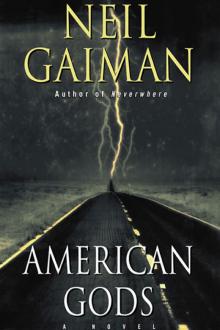 American Gods
American Gods Coraline
Coraline The Sandman: Book of Dreams
The Sandman: Book of Dreams Murder Mysteries
Murder Mysteries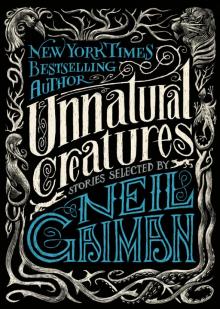 Unnatural Creatures
Unnatural Creatures Eternity's Wheel
Eternity's Wheel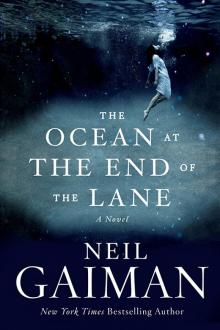 The Ocean at the End of the Lane
The Ocean at the End of the Lane Good Omens
Good Omens Stardust
Stardust Odd and the Frost Giants
Odd and the Frost Giants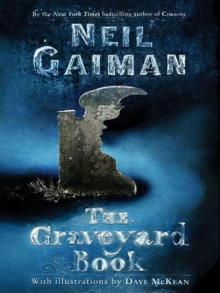 The Graveyard Book
The Graveyard Book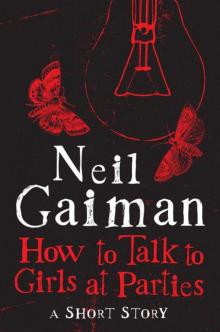 How to Talk to Girls at Parties
How to Talk to Girls at Parties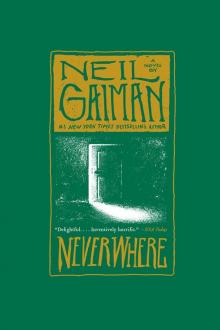 Neverwhere
Neverwhere Snow, Glass, Apples
Snow, Glass, Apples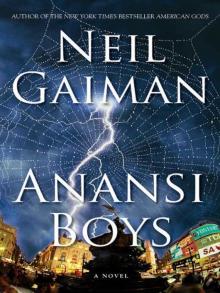 Anansi Boys
Anansi Boys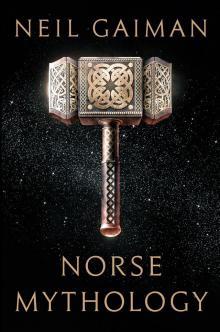 Norse Mythology
Norse Mythology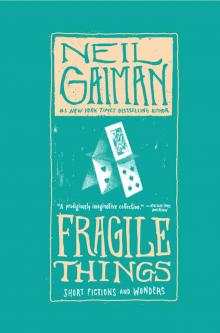 Fragile Things: Short Fictions and Wonders
Fragile Things: Short Fictions and Wonders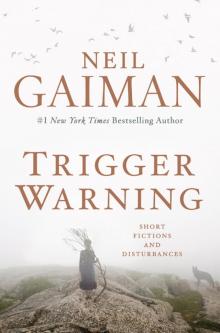 Trigger Warning: Short Fictions and Disturbances
Trigger Warning: Short Fictions and Disturbances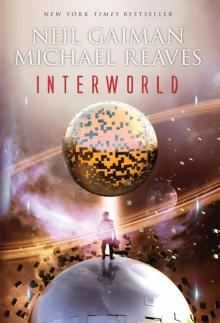 InterWorld
InterWorld The Monarch of the Glen
The Monarch of the Glen The Neil Gaiman Reader
The Neil Gaiman Reader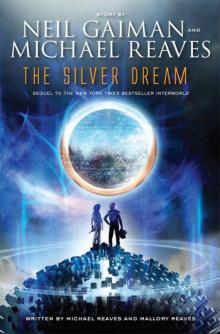 The Silver Dream
The Silver Dream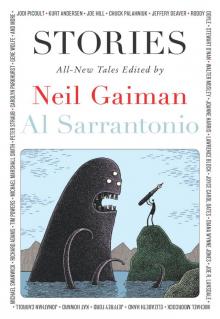 Stories
Stories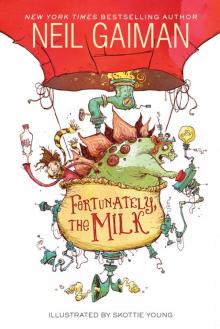 Fortunately, the Milk
Fortunately, the Milk Art Matters
Art Matters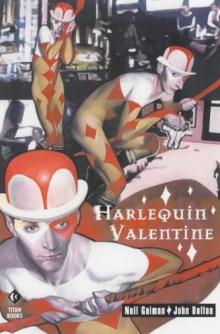 Harlequin Valentine
Harlequin Valentine The Quite Nice and Fairly Accurate Good Omens Script Book
The Quite Nice and Fairly Accurate Good Omens Script Book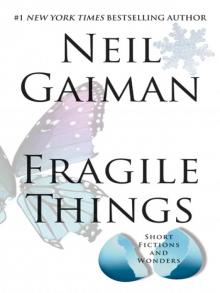 Fragile Things
Fragile Things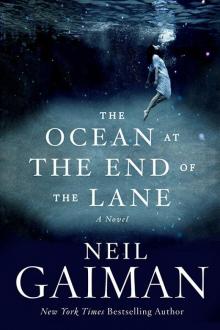 The Ocean at the End of the Lane: A Novel
The Ocean at the End of the Lane: A Novel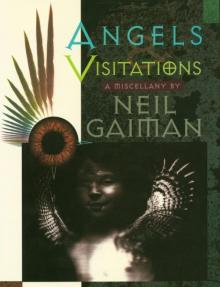 Angels and Visitations
Angels and Visitations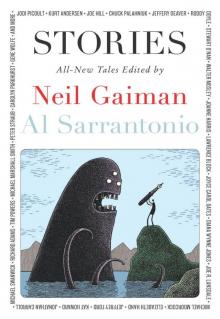 Stories: All-New Tales ngss-1
Stories: All-New Tales ngss-1 Don't Panic
Don't Panic Darker Terrors
Darker Terrors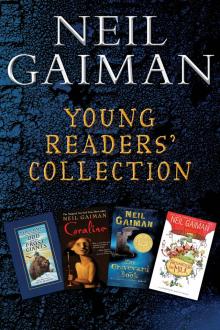 Neil Gaiman Young Readers' Collection
Neil Gaiman Young Readers' Collection A Study In Emerald
A Study In Emerald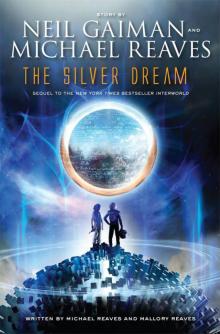 The Silver Dream: An InterWorld Novel
The Silver Dream: An InterWorld Novel Feeders and Eaters
Feeders and Eaters Psychos
Psychos The View from the Cheap Seats
The View from the Cheap Seats Trigger Warning
Trigger Warning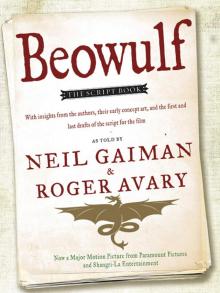 Beowulf
Beowulf Nessun Dove
Nessun Dove Doctor Who: Nothing O'Clock: Eleventh Doctor: 50th Anniversary
Doctor Who: Nothing O'Clock: Eleventh Doctor: 50th Anniversary The Book of Cthulhu
The Book of Cthulhu